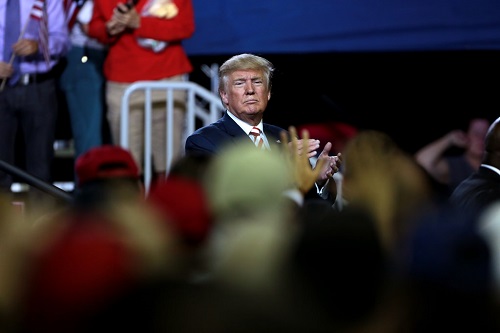Gage Skidmore photo
By
Tom Arms
I have discovered a new word—Whataboutery. I would like to claim that I coined it. But that would be a lie. It is in the esteemed Oxford English Dictionary which says the word has been around since the 1970s. I just missed it.
However, it is missing from the pages of America’s premier lexicon Webster’s. So perhaps I can claim the credit for introducing it into the American vocabulary.
All that is by the by, the real issue is what is it about whataboutery that has struck my fancy and what is its definition.
The OED defines whataboutery as follows: “The technique or practice of responding to an accusation or difficult question by making a counter-accusation or raising a different issue.”
If you want to use it in a sentence you could say: “All too often, well-intentioned debate descends into whataboutery.”
There is even a useful ism synonym—Whataboutism.
Both words are very close to the well-known morality phrase: “Two wrongs don’t make a right.” This is a sentence I heard from my mother throughout childhood. It was uttered every time I tried to justify a usually nefarious action by whining: Johnny’s/Sam’s/Joe’s…(fill in the blank) mother let them…(fill in another blank).”
I never got away with it. But it seems that all too often politicians are being allowed to get away with sentences that start with “Whatabout”—and they are supposed to be responsible, respected, adult leaders. It just doesn’t seem fair.
Let’s be clear, Whataboutery is a smokescreen, distraction, diversion. Sometimes it is obvious. I have often heard Americans justify Donald Trump’s immigration policies with the words “Whatabout the immigration policies of Britain, Poland, Hungary, Australia, Switzerland, Japan….”
Or perhaps we are talking about the death penalty and the fickle finger of whatabout is turned around to point at those well known bastions of human rights such as Iran, Saudi Arabia, Turkey, Russia, Iraq, or Turkmenistan.
Then there is the more subtle whataboutism. The word is not clearly stated but is implied in the action. A good example of this might be President Trump’s use of the FBI to repeatedly investigate Hillary Clinton for her misuse of emails during her tenure as Secretary of State. Twice she has been investigated and twice she has been cleared.
Why does Trump persist? Because he is implicitly shouting: “Whatabout Hillary” every time someone accuses him of collusion with the Russians, racism, sexual harassment, corruption, nepotism or just plain bad taste. His whataboutism—is a smokescreen to divert public attention away from questionable policies and actions.
Donald Trump is probably the most glaring exponent of whataboutery. But he is not alone. Just tune into the BBC for Prime Minister’s Question Time every Wednesday. You will hear Theresa May employing her own brand of whataboutism. It may be more subtle than the current occupant of the White House, but it is clear that she is saying: “Well, if you think things are bad now, whatabout when Labour was in government or whatabout you just see what happens if Labour returns to government.”
You can hear the echoes of whataboutery bouncing off the walls of Westminster and parliaments around the world.
The most amazing thing about this political phenomenon is that the public allows its political leaders to get away with it. The history of the world has never enjoyed such a highly educated population. From the streets of New York to the jungles of Uganda and mountains of Tibet, there have never been so many literate, numerate and educated people in the world.
The reason political leaders escape censure for whataboutery is that their grassroots supporters are—if anything—even more guilty of the offense. Whatboutery is rampant at every level of political discourse. It poisons debate and creates divisions. The proponents of whataboutery aim to turn the argument around so that the other side is forced into justifying another wrong action or, at the very least, diluting their own wrong actions. In doing so, they accentuate and reinforce differences when both sides should be focused on finding a consensus. After all, as my mother said, two wrongs don’t make a right.
Tom Arms is editor of LookAheadnews.com. Sign up now for the weekly diary of world news events.
LookAhead Radio World Report for week commencing 29 January 2018:
Tom Arms
I am a journalist, entrepreneur and historian with extensive experience in print, web and broadcast journalism. I started as a diplomatic correspondent, wrote several books (The Falklands Crisis, World Elections On File and the Encyclopedia of the Cold War), and then in 1987 started my own business (Future Events News Service, www.fensinformation.com) which over 25 years established itself as the world and UK media’s diary. Our strapline was: “We set the world’s news agenda.” I sold FENS in December 2012 but retained the exclusive broadcast rights to all of FENS data. To exploit these rights I set up LookAhead TV which produces unique programmes which “Broadcasts Tomorrow Today” so that viewers can “Plan to Participate.” LookAhead has appeared regularly on Vox Africa, Radio Tatras International, The Conversation and Voice of Africa Radio.
In addition to being a syndicated broadcaster and columnist on global affairs, Tom is also available for speaking engagements and can be contacted on Twitter, Linkedin and email: [email protected].



No Comments Yet!
You can be first to comment this post!